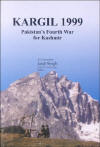|
| Home | About Kashmir Herald | |
Volume 1, No. 9 - February 2002 |
|
|
|
Muttahida Jehad Council
(United Jehad Council) The Muttahida Jehad Council (MJC), a conglomerate of Pakistan-based terrorist outfits was formed in November 1990 to bring under a single platform all the outfits involved in the insurgency in Jammu and Kashmir (J&K). Currently it has 13 members and two outfits have been accorded observer status. The headquarters of the MJC is at Muzaffarabad in Pakistan occupied Kashmir (PoK). At the time of inception, all the terrorist outfits operating in J&K were required to register with the MJC. The council aims at joining forces and resources to augment the terrorist operations in J&K. The Muttahida Jehad Council also acts as the primary public voice of the terrorist outfits currently active in the state of Jammu and Kashmir. Azam Inquilabi was initially appointed the Chairman of MJC. Undated news reports said that since he was found to be ineffective in increasing the lethality of the terrorist operations, Tanvir ul Islam replaced him as chief of the MJC. With a view to expanding the terrorist canvas in J&K, the Pakistani establishment is reported to have organized a meeting of the various MJC constituents in December 1995. Consequent to the meeting, Syed Salahuddin, ‘Supreme Commander’ of the Hizb-ul-Mujahideen (HM) was appointed the Chief of the conglomerate. The HM chief was ‘elected’ as the MJC chairman for the fourth time at a meeting in Muzaffarabad on November 6, 1999. The meeting is also reported to have evolved a comprehensive strategy to transform the year 2000 into a decisive year for the terrorist activity by increasing the magnitude of attacks on the security forces deployed in J&K. Consequent to the unilateral cease-fire announced by the HM on July 24, 2000, the MJC expelled the outfit from the conglomerate and removed Syed Salahuddin as its chief. Mohammad Usman, a representative of the Muslim Janbaz Force who was appointed as the acting Chairman, replaced him. While criticizing the Hizb cease-fire, the MJC said that it was "wastage of sacrifices and passage to servitude". MJC rejected the ceasefire with the argument that India had a "history of breaking promises and pacts and that atrocities and excesses by security forces were unabated in Kashmir." Following the withdrawal of the cease-fire by the outfit on August 8, efforts began within the conglomerate to reinduct HM. The outfit was re-inducted and Salahuddin re-appointed as Chairman on October 22, 2000 through ‘voting’ wherein the HM is alleged to have secured a majority vote of eight votes. The Tehreek-ul-Mujahideen, Al Umar, Al Barq and the Hizb-ul-Momineen are reported to have opposed the re-induction while indicating that the HM should formally admit to its cease-fire being a ‘mistake’ and request for pardon. The MJC also rejected the Ramadan cease-fire announced by the Government of India on November 19, 2000. In a statement released from Muzaffarabad on November 20, 2000, the MJC said that its members would, "…launch massive attacks on the Indian army during Ramazan, particularly on its 17th day when the battle of Badr was fought…" The following terrorist outfits are currently members of the Muttahida Jehad Council:
The outfits that have been accorded observer status by the conglomerate are Lashkar-e-Toiba and Al Badr. Courtesy: South Asia Terrorism Portal |
 |
 |
 |
|
| Archives
| Privacy Policy |
Copyrights
| Contact
Us | |
||